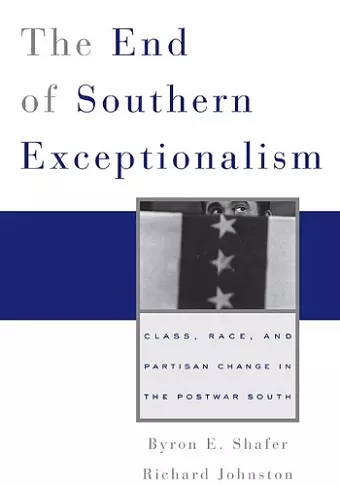The End of Southern Exceptionalism
Class, Race, and Partisan Change in the Postwar South
Richard Johnston author Byron E Shafer author
Format:Paperback
Publisher:Harvard University Press
Published:30th Apr '09
Currently unavailable, and unfortunately no date known when it will be back

Political scientists, following one argument advanced in V.O. Key's 1948 classic Southern Politics, have long declared that the increasing Republicanism of the American South was a response to racial issues. Now Byron Shafer and Richard Johnston present a new view in The End of Southern Exceptionalism. Noting that Key also argued that economics affected Southern politics, they use election and polling data to show that the increasing Republicanism of the South has been primarily a response to the vast economic change in the region since 1948. Their argument is convincing, and will be as important in assessing Southern politics as Key's. -- Michael Barone, Senior Writer, U.S. News & World Report, co-author of The Almanac of American Politics 1972-2006, and author of Our Country: The Shaping of American from Roosevelt to Reagan Byron Shafer and Richard Johnston have broken new ground in the study of race and class in the post-war South. Challenging orthodox analyses, Shafer and Johnston show the crucial importance of class, especially the powerful role of economic elites, in driving the early movement toward the Republican Party. The End of Southern Exceptionalism: Class, Race, and Partisan Change in the Postwar South is essential reading, not just for students of American politics, but for all those interested in the transformation of the most interesting region of the country. -- Thomas Byrne Edsall, Washington Post writer and co-author of Chain Reaction: The Impact of Race, Rights, and Taxes on American Politics
The shift in Southern political allegiance from Democratic to Republican has been explained, by scholars and journalists, as a white backlash to the civil rights revolution. Here, the authors refute that view: The true story, they argue, is instead one of dramatic class reversal, beginning in the 1950s and pulling everything else in its wake.
The transformation of Southern politics after World War II changed the political life not just of this distinctive region, but of the entire nation. Until now, the critical shift in Southern political allegiance from Democratic to Republican has been explained, by scholars and journalists, as a white backlash to the civil rights revolution.
In this myth-shattering book, Byron Shafer and Richard Johnston refute that view, one stretching all the way back to V. O. Key in his classic book Southern Politics. The true story is instead one of dramatic class reversal, beginning in the 1950s and pulling everything else in its wake. Where once the poor voted Republican and the rich Democrat, that pattern reversed, as economic development became the engine of Republican gains. Racial desegregation, never far from the heart of the story, often applied the brakes to these gains rather than fueling them.
A book that is bound to shake up the study of Southern politics, this will also become required reading for pundits and political strategists, for all those who argue over what it takes to carry the South.
Political scientists, following one argument advanced in V.O. Key's 1948 classic Southern Politics, have long declared that the increasing Republicanism of the American South was a response to racial issues. Now Byron Shafer and Richard Johnston present a new view in The End of Southern Exceptionalism. Noting that Key also argued that economics affected Southern politics, they use election and polling data to show that the increasing Republicanism of the South has been primarily a response to the vast economic change in the region since 1948. Their argument is convincing, and will be as important in assessing Southern politics as Key's. -- Michael Barone, Senior Writer, U.S. News & World Report, co-author of The Almanac of American Politics 1972–2006, and author of Our Country: The Shaping of American from Roosevelt to Reagan
Byron Shafer and Richard Johnston have broken new ground in the study of race and class in the post-war South. Challenging orthodox analyses, Shafer and Johnston show the crucial importance of class, especially the powerful role of economic elites, in driving the early movement toward the Republican Party. The End of Southern Exceptionalism: Class, Race, and Partisan Change in the Postwar South is essential reading, not just for students of American politics, but for all those interested in the transformation of the most interesting region of the country. -- Thomas Byrne Edsall, Washington Post writer and co-author of Chain Reaction: The Impact of Race, Rights, and Taxes on American Politics
Enlightened opinion holds that the South is a racist, economic backwater where white backlash against the Civil Rights movement replaced the Democratic "Solid South" with Republican dominance in the region. Now Byron Shafer and Richard Johnston are challenging this enduring "myth." In The End of Southern Exceptionalism, they convincingly argue that it wasn't the GOP playing the race card that spurred the rise of Southern Republicans, but post-World War II economic development. -- Robert Saldin * New York Post *
Byron E. Shafer and Richard Johnston, challenge the notion of regional distinctiveness and the centrality of race to Southern politics in their meticulous study, The End of Southern Exceptionalism. They scour reams of electoral returns--this book is a sweet fix for political junkies--to challenge the theory that the Republican Party is nothing more than the remnant of the old conservative Democratic Party. -- David Turner * News and Observer *
- Winner of Best Book Award in Race, Ethnicity, and Politics 2007
- Nominated for Leon Epstein Outstanding Book Award 2007
- Nominated for Woodrow Wilson Foundation Award 2007
- Nominated for Richard F. Fenno Prize 2007
- Nominated for Allan Sharlin Memorial Award 2007
ISBN: 9780674032491
Dimensions: unknown
Weight: unknown
240 pages